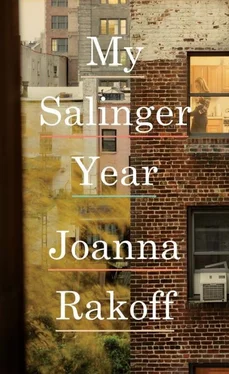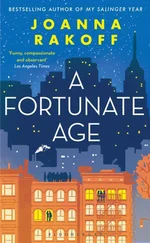“Okay!” cried Max, raising his fist in the air.
“Now, Max,” said my boss, an edge rising in her voice. It was strange: Max generated pretty much all the Agency’s new business. He’d just settled a deal for something in the sum of two million dollars. But my boss still regarded him as an interloper, a rebel without proper respect for the Agency’s filing system. She did not, I suspected, consider him “an Agency person,” like James and Hugh—and me. She’d quietly doled out this praise half a dozen times now. And though I relished it—I was nothing if not, as Don perpetually told me, the Obedient Child—it occurred to me that if these were my two potential futures, the choice was abundantly clear: I wanted to be Max, not my boss. To be Max was not just to broker big deals but to be utterly engaged with contemporary literature, as entangled with the ins and outs of narrative style as I’d been as a grad student, albeit in a far less rarefied way; to be in daily conversation with great writers and editors who cared deeply about words, language, story, which was another way of simply being engaged with the world, of trying to make sense of the world, rather than retreating from it, trying to place an artificial order on the messy stuff of life, preferring dead writers to living ones.
But then another, sobering thought occurred to me. Before I started this job, hadn’t I wanted to count myself among the living ones?
That night, as I brushed my teeth in the bathroom, Don called to me from the couch. “Buba! Come here. I want to show you something.” Inside me, something cracked and splintered into a million pieces. “Please stop calling me that,” I shouted, storming into the living room. “I’m not a child.” His large eyes grew larger and I thought, for a second—unbelievably—they might be filling with tears. “Do you know why I call you that?” he asked. I shook my head. And so he told me.
Don had a former student named Masha, with whom he’d remained friends. Masha emigrated from Russia in the early 1990s, and though he had enormous problems with communism—having not just experienced the philosophy in practice but been persecuted under it—Don was still thrilled to have found an actual Soviet with whom he could endlessly discuss socialism, even if those discussions turned into arguments. Masha lived with his wife—who had also been Don’s student—in Washington Heights, in a large, dark apartment crammed with relics of Russian life and the toys of their three children, the youngest of whom they considered a miracle baby, for though both Masha and his wife were dark—blue-black hair, olive complexions, thick brows—through some trick of genetics, this last child had emerged from the womb with pale pink skin and blond curls and lovely gray-blue eyes. Her disposition, too, was extraordinarily sunny. “She’s like a child of light ,” Don told me. “She’s just so cute and sweet that no matter what she does you just want to pick her up and hug her.” The child’s name was Anna or Natalya, but everyone called her the Buba. “Why?” I asked. Don shrugged and laughed. A real laugh. Not his ironic, mean laugh, his default laugh, a sort of cackle. “She’s just the Buba . There’s just no other word for her. I can’t explain it. You have to meet her and you’ll understand. She’s just all light .” He stretched his arms above his head and yawned. We had seated ourselves on the gray couch in the tiny living room, a couch we’d pulled in off the street with the help of Don’s friend Bart, an enormously tall poet, who composed his own verse around lines from famous poems. “So I was there, visiting Masha, this one afternoon, right after I met you, and the Buba was sitting on his lap, and it suddenly hit me. That you’re like the Buba.”
“ I’m like the Buba?” I did not have blond curls or gray-blue eyes. And even during the years when I was an actual child, I had been told, frequently, that I lacked childlike qualities: My face was long and thin. I hated games. I preferred the company of adults.
“You are,” Don said, delighted. “You’re rosy and full of light. You walk through the world and it’s as if you’re filled with light. It was the first thing I noticed about you.”
“That’s not true,” I objected, awkwardly. “I’m not rosy. I’m kind of pale.”
“True?” asked Don. “There’s no true . There’s no one truth . That’s a schoolgirl thing.” He looked at me intently, his mouth pressed into a line, as if he were fighting off a wave of some undefined emotion. “The world is subjective. Experiential.” Then his face turned slack and the ironic glint returned to his eyes. He shook his head professorially. “You need to read Kant.”
It would not be an exaggeration to say that I’d always considered myself dark and heavy. A chubby child, burdened by sorrows: my own, those of my family, my plagued, storied race. But that instant, something shifted. Was it possible that Don was right? That the world perceived me in a manner entirely different from how I perceived myself? Was it possible, too, that one could be complicated, intellectual, awake to the world, that one could be an artist , and also be rosy and filled with light? Was it possible that one could be all those things and also be happy ?
The next morning, the weather turned. The cold damp that had lingered well into the official start of summer evaporated overnight. I woke to a column of sunlight spilling through our kitchen window. From the back of the closet, I pulled my favorite dress, dark green and in a style alluding to the 1940s, with a collar and buttons up the front, an imitation of those dresses on Leigh’s floor. It was wrinkled—crushed by the heavy wools of winter—but I pulled it on anyway, over a black slip, hoping it would uncrease on my way to the office, then raced out the door and into the fresh, warm air, turning onto Bedford, where the fig trees were in bloom, the tiny white flowers lining their slim gray branches, the street suddenly quaint and pretty, rather than industrial and ugly. Williamsburg’s charms were not, are not, physical. Bedford, the main thoroughfare of the North Side, could be the high street in, say, Milwaukee, with its low storefronts and brick row houses. This was not the New York of Woody Allen, the New York of high-rises and doormen and big dreams and Hollywood montages. But it was my New York. Mine. And I loved it.
Most mornings, I took the 6 train to Fifty-First Street, emerging at the corner of Fiftieth and Lex in the shadow of the Waldorf-Astoria’s wedding-cake glory. My boss, I knew, sometimes had lunch at the Waldorf’s pub, the Bull and Bear, the entrance of which was at the back of the hotel—clubby and discreet—on the Lexington Avenue side, the southeast corner. I’d never been inside, of course, but I’d memorized its faded, genteel insignia, purely from walking in its proximity every morning. At night, as I traipsed back to the subway from my office, I encountered the Waldorf’s grand front entrance, magically lit and reminiscent of the castle at the entrance to Disneyland.
On this particular morning, I skipped up the steps of the subway station, a warm breeze blowing the skirt of my dress. On Lex, I found a strange sight: a crowd of fire trucks racing down the avenue, their sirens off, the street strangely untrafficked. They were beautiful, those trucks, a brilliant red against the brilliant blue of the sky, and like the Agency they seemed like visitors from a different, pre-digital era, from the picture books my parents read to me in childhood.
I was early, as usual, and I stood on the corner, watching the trucks disappear down Lex. When I looked up, there was the Waldorf, looming in front of me. And before I could think better of it, I’d crossed to the northwest side of the avenue and pushed open the hotel’s back doors, which led—I discovered—to a not particularly grand, shabby even, vestibule. To my left, the Bull and Bear, now closed; to my right, the hotel’s other restaurant, Oscar’s. In front of me, an escalator leading I knew not where. I stepped on.
Читать дальше












